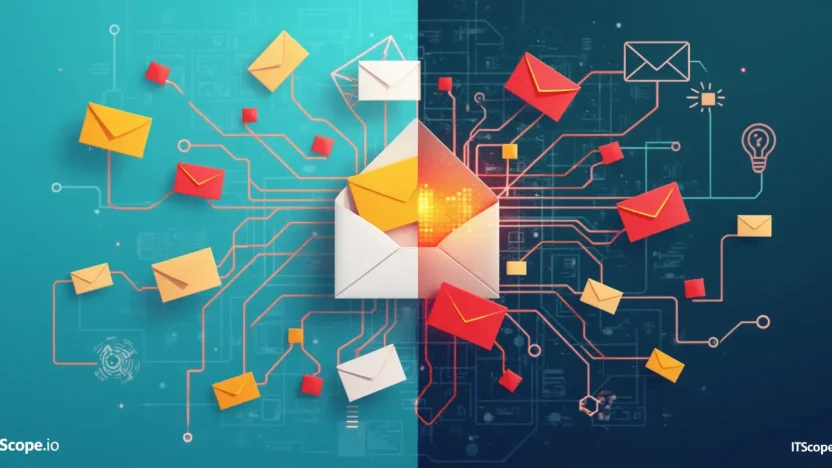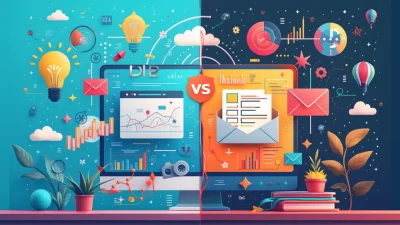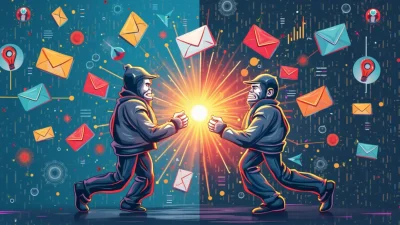In the fast-paced world of digital marketing, choosing the right tools can make or break your strategy. As businesses seek to optimize their outreach and conversions, the debate between email marketing vs marketing automation becomes increasingly pivotal. Are you maximizing your return on investment, or are you leaving potential untapped?
Understanding the nuances between these two powerful approaches can elevate your campaigns to newfound heights. In this guide, we’ll delve deep into the benefits and limitations of each, helping you make informed decisions that drive significant results. Ready to supercharge your marketing efforts? Let’s explore the world of email marketing and marketing automation.
Table of Contents
- Understanding Email Marketing
- Exploring Marketing Automation
- Comparative Analysis: Email Marketing vs Marketing Automation
- FAQs: Choosing the Right Strategy
- Conclusion: Making the Final Choice
Understanding Email Marketing
In today’s digital landscape, email marketing plays a crucial role in connecting with audiences. But what exactly does it entail? Let’s delve into this powerful tool. Email marketing focuses on sending targeted messages directly to your audience’s inbox, fostering a direct connection. It’s personal, cost-effective, and can yield impressive ROI when done right.
Why choose email marketing over marketing automation? Well, email marketing allows you to develop strong, personalized campaigns tailored to specific audience segments. This direct approach can lead to increased engagement and brand loyalty. Using tools such as Mailchimp or Constant Contact, businesses craft visually appealing emails, analyze performance metrics, and optimize content for peak results.
Key Benefits of Email Marketing
- Cost-Effective: One of the most budget-friendly marketing strategies.
- Highly Personalized: Allows for customization to reach diverse audience interests.
- Direct Engagement: Builds relationships with your audience by providing value straight to their inbox.
Is email marketing the ultimate choice in the email marketing vs marketing automation debate? That depends on your goals and resources. However, its robust communication potential makes it indispensable.
Exploring Marketing Automation
Have you ever wondered how businesses keep up with the fast-paced digital world? Enter marketing automation, a game-changer in the vast field of marketing. While traditional email marketing has its merits, marketing automation offers a more comprehensive approach, managing entire campaigns and not just the individual emails.
Marketing automation uses advanced software to streamline, automate, and measure repetitive online marketing tasks. This efficiency allows businesses to nurture leads, convert prospects into delighted customers, and measure marketing ROI.
Key benefit of using email marketing vs marketing automation: Automation empowers personalized, timely interactions with your audience that go beyond simple email blasts.
This technology not only saves time but also offers deeper insights into customer behavior. It enables segmentation and targets users based on their previous interactions. As a result, businesses can deliver more relevant content, enhancing customer engagement and nurturing relationships.
| Aspect | Email Marketing | Marketing Automation |
|---|---|---|
| Scope | Emails only | Multi-channel |
| Personalization | Limited | Advanced |
| Frequency | Manual Scheduling | Automated |
Ready to move beyond emailing and embrace holistic strategies? Marketing automation might just be the key to unlocking your brand’s potential.
Comparative Analysis: Email Marketing vs Marketing Automation
In the fast-paced world of digital marketing, choosing between email marketing vs marketing automation can feel daunting. Both strategies offer unique value, but which truly drives better results?
Email marketing focuses on sending finely crafted messages to segmented lists, prioritizing personal touch and direct engagement. It’s ideal for building relationships and driving direct sales.
On the other hand, marketing automation utilizes software to automate and optimize marketing tasks over multiple channels. This approach increases efficiency, ensuring consistent engagement throughout the customer journey.
Key benefit of using a hybrid approach: Combining the immediacy of email marketing with the scalability of marketing automation can amplify your reach and customer interactions.
| Aspect | Email Marketing | Marketing Automation |
|---|---|---|
| Approach | Manual, targeted | Automated, scalable |
| Personalization | High | Moderate to high |
| Efficiency | Time-intensive | Time-saving |
Incorporating both strategies can give businesses a competitive edge. While email marketing offers a personal connection, marketing automation brings unparalleled efficiency. Consider your goals and resources when deciding which strategy—or combination—suits your needs best.
Understanding the strengths of each can help in creating a campaign that not only resonates with your audience but also maximizes ROI. So, what’s your choice in the email marketing vs marketing automation debate?
FAQs: Choosing the Right Strategy
What is the difference between email marketing and marketing automation?
While email marketing focuses solely on sending emails to engage your audience, marketing automation streamlines multiple marketing processes using technology. Both have unique benefits depending on your goals.
Which should I choose: email marketing or marketing automation?
If you want a simple and direct way to connect with your audience, email marketing is great. For a scalable, personalized approach that saves time, consider marketing automation.
Conclusion: Making the Final Choice
When comparing email marketing vs marketing automation, consider your goals, budget, and resources. Choose email marketing for direct engagement, and opt for marketing automation to streamline procedures and boost efficiency. Ultimately, align your choice with your strategic objectives to drive the best results.



